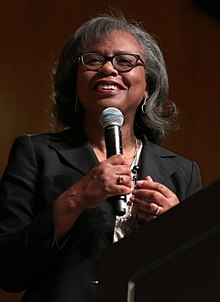
Nobody could have guessed that the televised Senate hearings on the nominations of Clarence Thomas to the U.S. Supreme Court would be the top-rated show of 1991. America’s collective mouth hung open in amazement at the brouhaha that brewed up around Judge Thomas’ worthiness based on the charges of sexual harassment by one Anita Hill. The hearings catapulted the issue of sexual harassment in the workplace into the most hotly debated and analyzed topic of the day, one that still reverberates years later. Prior to Anita’s brave stand, sexual harassment was mainly swept under the industrial gray carpeting of most offices, but she singlehandedly forced it to the very center of the national agenda.
The nation and, indeed, the world, watched transfixed as the incredibly poised Anita revealed her experiences with Clarence Thomas as a coworker. With great dignity, she testified that Thomas kept after her to go out with him, referred to himself as “an individual who had a very large penis and…used a name…in pornographic material,” and asked her to see “this woman (who) has this kind of breasts that measure this size,” in a seemingly endless barrage of ludicrous and lugubrious insults to her as a fellow professional. Senate hearings, usually desert dry and devoid of tabloid titillation, suddenly featured long discussions including the terms “penis” and “pubic hair.”
The prelude to the media circus took place when the president announced his choice of “black Horatio Alger” Clarence Thomas as the Supreme Court replacement for the retiring Thurgood Marshall. Anita Hill, a law professor at the University of Oklahoma, contacted Harriet Grant, the Judiciary Committee’s nominations counsel. She told Grant that Thomas had harassed her in a sexual and inappropriate manner when she had worked as his assistant at the Equal Employment Opportunity Commission. She had, in fact, quit the EEOC because of his behavior and gone into academia. Grant cc’d the senatorial committee on the allegations, but the Senate whipped through the approval process with nary a word about Hill’s report and prepared to vote for confirmation of Thomas. Then journalist shero Nina Totenberg of National Public Radio and New York Newsday’s Timothy Phelps broke the story wide open to a shocked public. Seven women from the House of Representatives marched in protest to the Senate building, demanding of the sheepish Senate committee to know why the committee had ignored Hill’s complaint.
Nothing in Hill’s background could have prepared her for the media onslaught. Born in 1956 as the youngest of thirteen children, she was raised in rural Oklahoma in a deeply religious family. An outstanding student, she graduated as valedictorian of her integrated high school, earned top honors in college, and was one of only eleven black students out of a class of 160 at Yale University Law School.
Even through Anita Hill had been promised immunity and total confidentiality, she appeared before the committee in a special session before the scrutiny of the nation. The Judiciary Committee was dismissive, as only Old Boys can be, of Anita Hill and her testimony, even going so far as to ask her if she was taking her revenge as the “woman scorned,” and they suggested that she was a patsy for radical liberals and feminists. While Anita’s allegations were ultimately disregarded and Clarence Thomas was voted in, Anita’s grace under pressure won many admirers who protested the Thomas appointment. The controversy remained headline news for months; polls of public opinion showed Anita Hill gaining and Bush losing points as I Believe You Anita! bumper stickers appeared on thousands of cars across America. For her outspokenness, she was awarded the Ida B. Wells Award from the National Coalition of 100 Black Women and named one of Glamour’s Ten Women of the Year in 1991.
Anita Hill’s courage of conviction made her a shero of the late twentieth century. In her words, “I felt I had to tell the truth. I could not keep silent.”
“You just have to tell the truth and that’s the most anyone can expect from you and if you get that opportunity, you will have accomplished something.” — Anita Hill
This excerpt is from The Book of Awesome Women by Becca Anderson, which is available now through Amazon and Mango Media.
